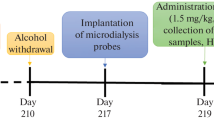Summary.
The study was designed to investigate the effects of NMDA receptor agonist on the behavioral activity in rats with experimental hyperammonemia. The experiments were performed on adult male Wistar rats. Experimental hyperammonemia was induced by intraperitoneal injections of tioacetamide (TAA, 200 mg/kg) for three consecutive days. Rats treated with saline (0.9%) served as control. Stimulation of the NMDA glutamatergic receptor was evoked by ip. injection of agonist N-methyl-D-aspartate acid (NMDA) in a dose of 30 mg/kg thirty minutes before experiments. Memory motivated affectively was evaluated in the passive avoidance responses. The speculative influence of the treatment on anxiety and motor activity was tested in elevated plus-maze and in open field respectively.
To show change of NMDA receptor function after various doses of agonist, the seizures evoked by N-methyl-D-aspartate acid was carried out. This experiment showed that with rise of dose of NMDA time to appear of convulsions was contracted in rats with hyperammonemia as well as in control rats. Dose of NMDA caused convulsions was three times as less in rats with hyperammonemia than dose in control. Time of duration of convulsions was proportional to applied dose of NMDA and it lengthened with rise of agonist’s dose in both groups of studied animals.
Furthermore, we observed that NMDA increased motor activity of control rats in open field test, but not in rats with hyperammonemia (treated tioacetamide). Hyperammonemia did not have significant influence on motor activity and on a passive avoidance latency. The NMDA given in control and in hyperammonemia, increased acquisition, consolidation and recall of a passive avoidance responses. Moreover, NMDA had anxiogenic-like profile in elevated plus-maze.
In rats with hyperammonemia NMDA had no influence on locomotor activity but it significantly increased memory in a passive avoidance responses. Furthermore, we observed that reactivity of NMDA glutamate receptor in rats with hyperammonemia was higher than in control rats.
Similar content being viewed by others
Author information
Authors and Affiliations
Rights and permissions
About this article
Cite this article
Fedosiewicz-Wasiluk, M., Hoły, Z., Wiśniewska, R. et al. The influence of NMDA, a potent agonist of glutamate receptor, on behavioral activity of rats with experimental hyperammonemia evoked by liver failure. Amino Acids 28, 111–117 (2005). https://doi.org/10.1007/s00726-004-0122-4
Received:
Accepted:
Published:
Issue Date:
DOI: https://doi.org/10.1007/s00726-004-0122-4




